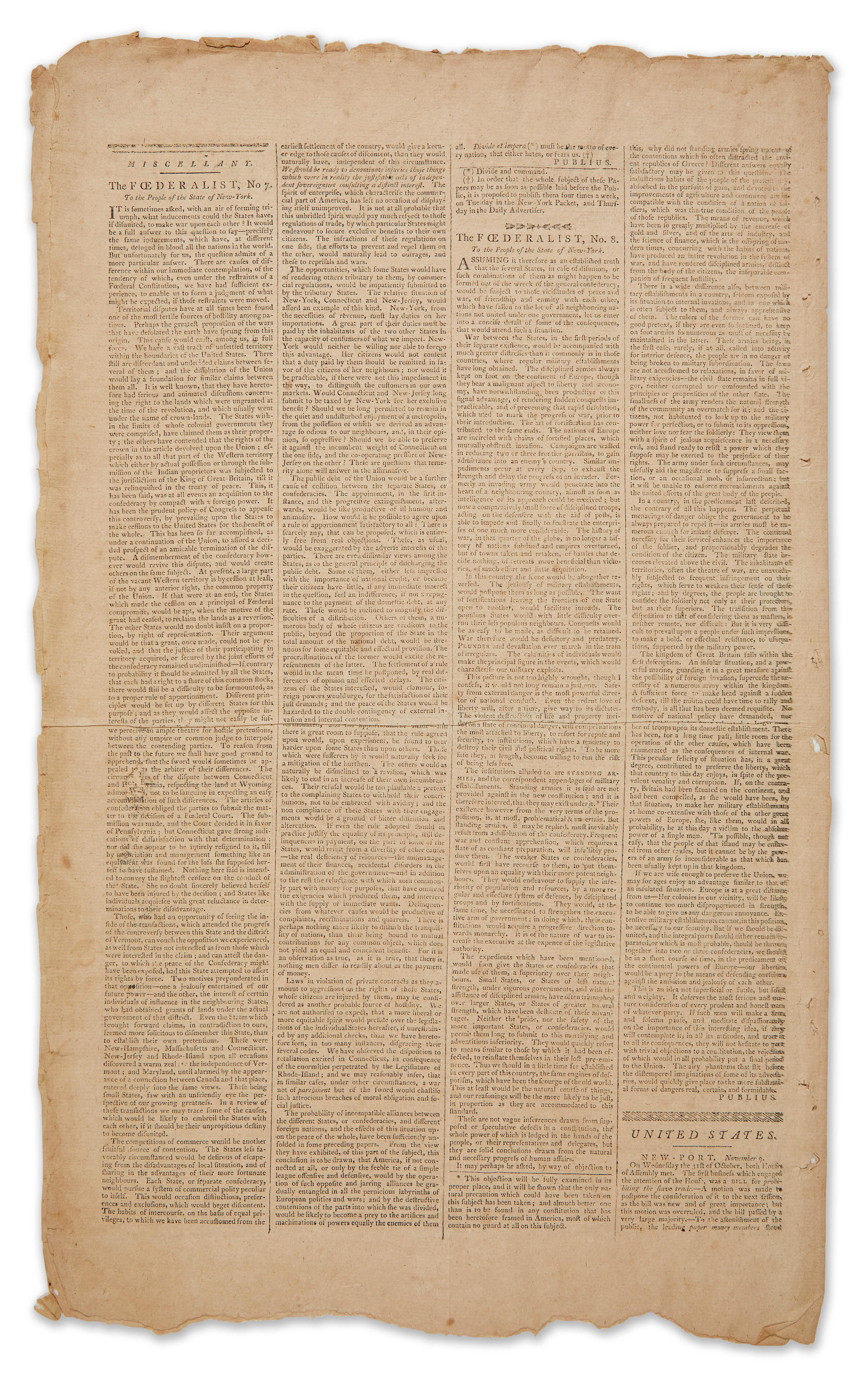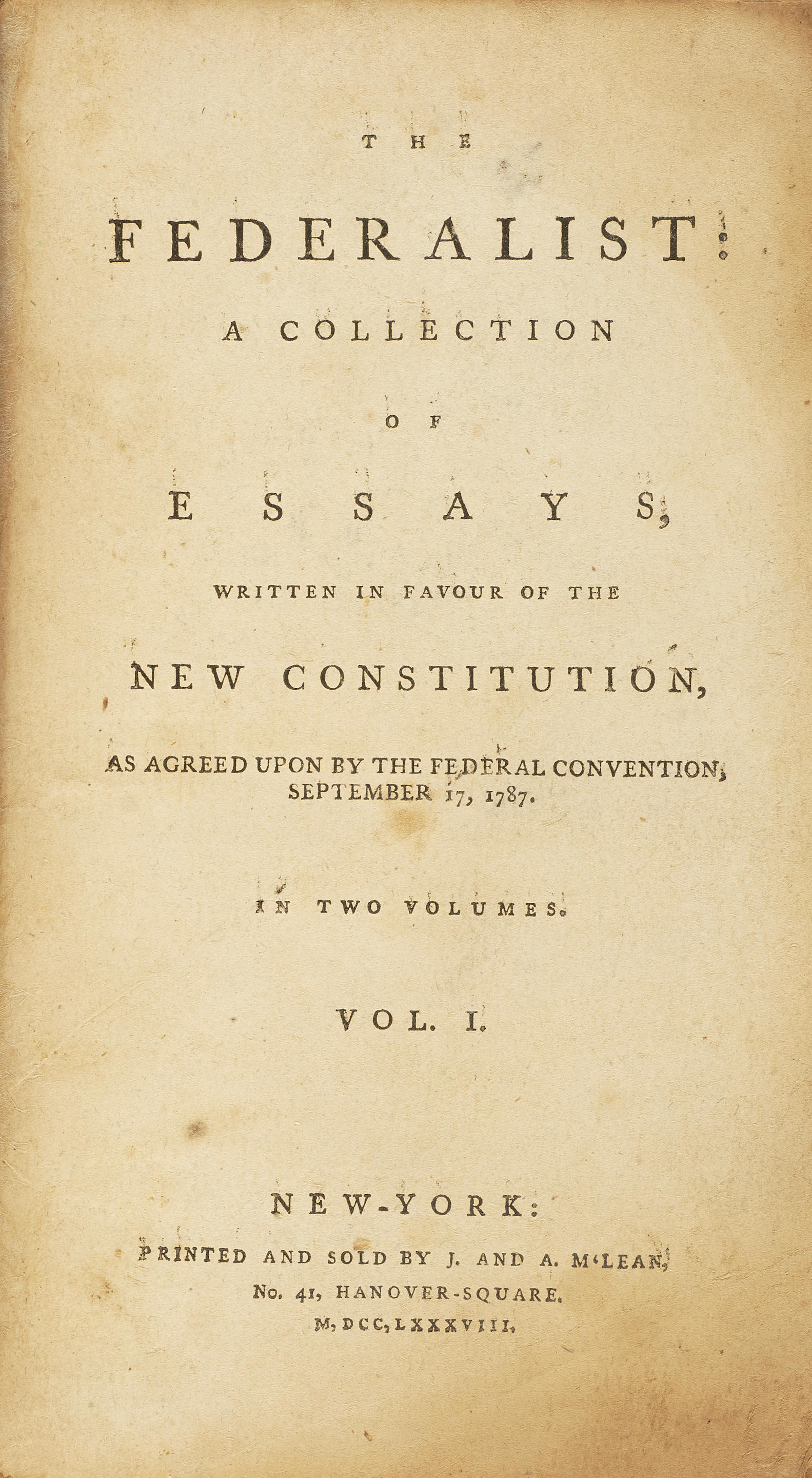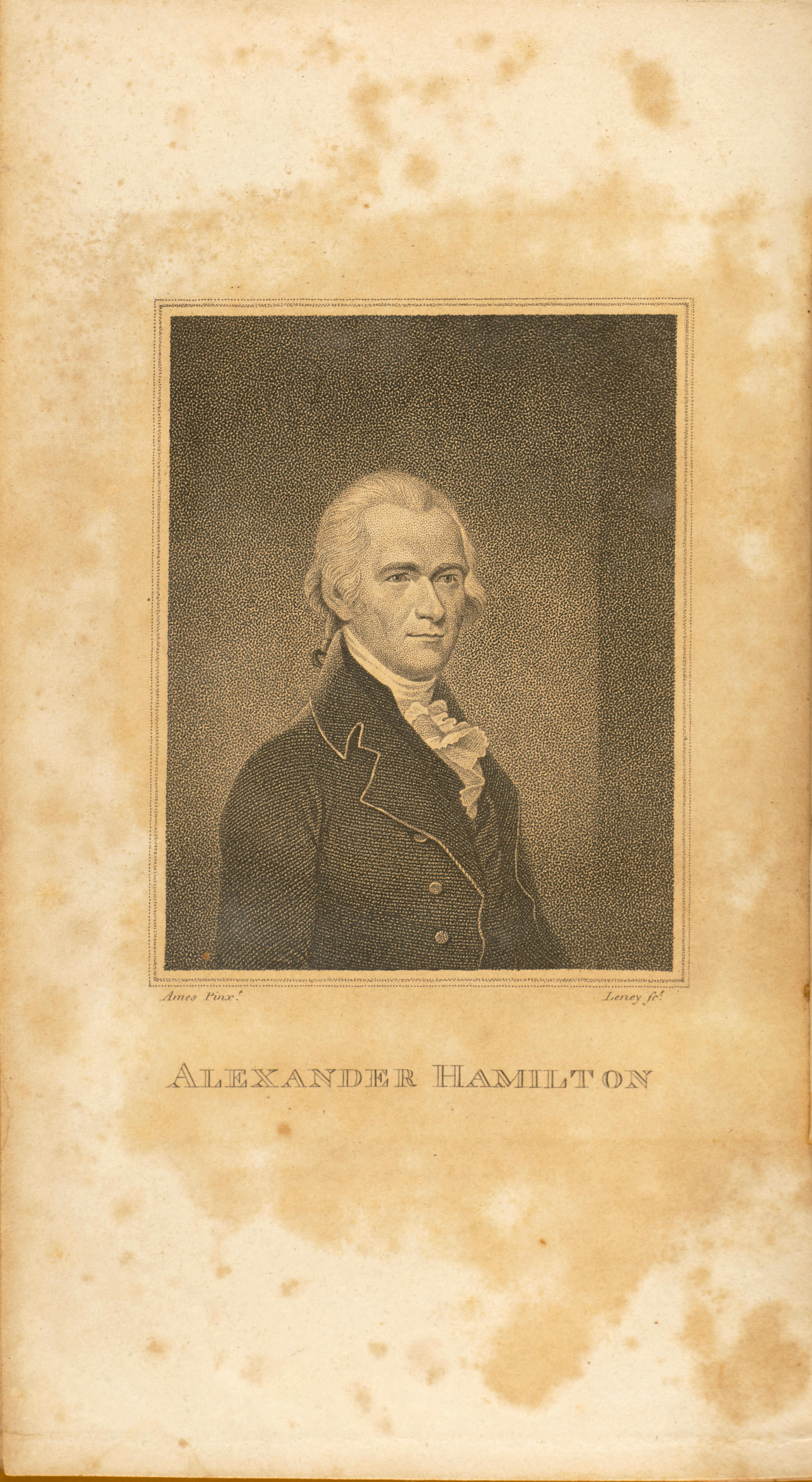Details
THE FEDERALIST PAPERS – [HAMILTON, Alexander (1739-1802), James MADISON (1751-1836) and John JAY (1745-1829)]. The Federalist: A Collection of Essays, Written in Favour of the New Constitution, as Agreed Upon by the Federal Convention, September 17, 1787. New York: John and Andrew M'Lean, 1788.
"Let [every man] reflect that the object upon which he is to decide is not a particular interest of the community, but the very existence of the nation..." (Alexander Hamilton, Federalist no. 85).
Rare thick-paper issue of the first edition. This copy was originally owned by William Cocke, who around this time was drafting the constitution for the proposed State of Franklin. The Federalist collects all 85 seminal essays written in defense of the newly drafted U.S. Constitution and published under the pseudonym "Publius" in various New York newspapers. Together, they constitute "the most thorough and brilliant explication of the Federal Constitution (or any other constitution) ever written" (Page Smith, The Constitution: A Documentary and Narrative History, pp. 263-264) and "one of the new nation's most important contributions to the theory of government" (Printing and the Mind of Man). It was printed in two issues, one on regular, thin paper and a smaller number on thick paper, as here. The thick-paper issues are considerably rarer and were presumably intended for presentation. There have been just five other thick-paper copies recorded in the auction records of ABPC for the past 50 years.
Included here is the complete text of the U.S. Constitution, headed "Articles of the New Constitution," with the accompanying resolutions of the Constitutional Convention (vol. 2, pp. [367]-384). Essays 78 to 85 were printed first in this volume and only later published in the newspapers, timed to coincide with the New York State Convention in Albany.
This series of essays is "justly recognized as a classic exposition of the principles of republican government" (R.B. Bernstein, Are We to be a Nation? The Making of the Constitution, 1987, p.242). The Federalist Papers grew out of the heated pamphlet wars and tumultuous debate over ratification of the Constitution. Concerned that the state of New York might refuse to ratify, Hamilton enlisted John Jay and James Madison to collaborate on a series of interpretive essays supporting the new plan of government and refuting point-by-point the objections of its many detractors. "Hamilton wrote the first piece in October 1787 on a sloop returning from Albany... He finished many pieces while the printer waited in a hall for the completed copy" (R. Brookhiser, Alexander Hamilton: American, 1999, pp.68-69). Due to Jay's illness and Madison's return to Virginia, the bulk of the 85 essays, in the end, were written by Hamilton. "Despite the hurried pace at which they worked—they ground out four articles nearly every week—what began as a propaganda tract, aimed only at winning the election for delegates to New York's state ratifying convention, evolved into the classic commentary upon the American Federal system" (F. McDonald, Alexander Hamilton, p.107). Washington, the former President of the Constitutional Convention, precisely spelled out the work's importance when he wrote that The Federalist "will merit the Notice of Posterity; because in it are candidly and ably discussed the principles of freedom and the topics of government, which will always be interesting to mankind."
The original owner was William Cocke, a pioneer lawyer who "lived a long and colorful life on the frontier of the Old Southwest" (DAB). Born in Virginia, he moved to frontier east Tennessee, served as a captain of militia during Lord Dunmore's War and fought in the Revolution before moving to Kentucky in 1775 with Daniel Boone He held various offices, and when a new State of Franklin (present-day eastern Tennessee) was proposed in 1784-1788, Cocke helped form its constitution. He was a leader in Franklin's movement for separate statehood, not only working on the constitution, but also serving in its legislature and its Council of State, negotiating in its name with the Cherokee, and traveling to Congress as an unseated delegate. As late as June, 1788, Alexander Hamilton referred in Congress to the likelihood of Franklin's statehood, along with Vermont and Kentucky (17 June 1788).
Church 1230; Cohen 2818; Evans 21127; Ford 17; Grolier American 100; Howes H-114 ("d"=very rare); Federal Hundred 19; PMM, 234; Sabin 23979; Streeter sale 1049. R.B. Bernstein, Are We to Be a Nation? The Making of the Constitution, (1987), p.242. R. Brookhiser, Alexander Hamilton: American (1999), pp.68-69. F. McDonald, Alexander Hamilton: A Bibliography, p. 107.
Two volumes, 12mo (160 x 95mm). PRINTED ON THICK PAPER. (Repaired closed tear to vol. 2, A6 and a couple of others; a little staining to edges in E gathering of vol. 1, washed, a few pencil marks.) Modern brown half morocco, spines with six compartments, gilt-titled in one, all edges gilt, by Stikeman. Custom clamshell case. Provenance: William Cock (or Cocke), 1747-1828 (pale signature "W. Cock" on each title-page); an early ink inscription on a preliminary blank quotes an article in the The Portfolio, regarding Hamilton's attribution of the various papers (slightly tattered) – William Lamb of Norfolk, Virginia, 1835-1909 (his sale, Merwin-Clayton, 2-3 February 1910, lot 206) – Charles Walker Andrews, 1861-1946 (bookplates) – Sotheby's New York, 31 October 1985, lot 238 – Kenneth Nebenzahl, 1927-2020 (bookplates; his sale, Christie's New York, 10 April 2012, lot 23) – William S. Reese, 1955-2018 (bookplates).
Details
THE FEDERALIST PAPERS – [HAMILTON, Alexander (1739-1802), James MADISON (1751-1836) and John JAY (1745-1829)]. The Federalist: A Collection of Essays, Written in Favour of the New Constitution, as Agreed Upon by the Federal Convention, September 17, 1787. New York: John and Andrew M'Lean, 1788.
"Let [every man] reflect that the object upon which he is to decide is not a particular interest of the community, but the very existence of the nation..." (Alexander Hamilton, Federalist no. 85).
Rare thick-paper issue of the first edition. This copy was originally owned by William Cocke, who around this time was drafting the constitution for the proposed State of Franklin. The Federalist collects all 85 seminal essays written in defense of the newly drafted U.S. Constitution and published under the pseudonym "Publius" in various New York newspapers. Together, they constitute "the most thorough and brilliant explication of the Federal Constitution (or any other constitution) ever written" (Page Smith, The Constitution: A Documentary and Narrative History, pp. 263-264) and "one of the new nation's most important contributions to the theory of government" (Printing and the Mind of Man). It was printed in two issues, one on regular, thin paper and a smaller number on thick paper, as here. The thick-paper issues are considerably rarer and were presumably intended for presentation. There have been just five other thick-paper copies recorded in the auction records of ABPC for the past 50 years.
Included here is the complete text of the U.S. Constitution, headed "Articles of the New Constitution," with the accompanying resolutions of the Constitutional Convention (vol. 2, pp. [367]-384). Essays 78 to 85 were printed first in this volume and only later published in the newspapers, timed to coincide with the New York State Convention in Albany.
This series of essays is "justly recognized as a classic exposition of the principles of republican government" (R.B. Bernstein, Are We to be a Nation? The Making of the Constitution, 1987, p.242). The Federalist Papers grew out of the heated pamphlet wars and tumultuous debate over ratification of the Constitution. Concerned that the state of New York might refuse to ratify, Hamilton enlisted John Jay and James Madison to collaborate on a series of interpretive essays supporting the new plan of government and refuting point-by-point the objections of its many detractors. "Hamilton wrote the first piece in October 1787 on a sloop returning from Albany... He finished many pieces while the printer waited in a hall for the completed copy" (R. Brookhiser, Alexander Hamilton: American, 1999, pp.68-69). Due to Jay's illness and Madison's return to Virginia, the bulk of the 85 essays, in the end, were written by Hamilton. "Despite the hurried pace at which they worked—they ground out four articles nearly every week—what began as a propaganda tract, aimed only at winning the election for delegates to New York's state ratifying convention, evolved into the classic commentary upon the American Federal system" (F. McDonald, Alexander Hamilton, p.107). Washington, the former President of the Constitutional Convention, precisely spelled out the work's importance when he wrote that The Federalist "will merit the Notice of Posterity; because in it are candidly and ably discussed the principles of freedom and the topics of government, which will always be interesting to mankind."
The original owner was William Cocke, a pioneer lawyer who "lived a long and colorful life on the frontier of the Old Southwest" (DAB). Born in Virginia, he moved to frontier east Tennessee, served as a captain of militia during Lord Dunmore's War and fought in the Revolution before moving to Kentucky in 1775 with Daniel Boone He held various offices, and when a new State of Franklin (present-day eastern Tennessee) was proposed in 1784-1788, Cocke helped form its constitution. He was a leader in Franklin's movement for separate statehood, not only working on the constitution, but also serving in its legislature and its Council of State, negotiating in its name with the Cherokee, and traveling to Congress as an unseated delegate. As late as June, 1788, Alexander Hamilton referred in Congress to the likelihood of Franklin's statehood, along with Vermont and Kentucky (17 June 1788).
Church 1230; Cohen 2818; Evans 21127; Ford 17; Grolier American 100; Howes H-114 ("d"=very rare); Federal Hundred 19; PMM, 234; Sabin 23979; Streeter sale 1049. R.B. Bernstein, Are We to Be a Nation? The Making of the Constitution, (1987), p.242. R. Brookhiser, Alexander Hamilton: American (1999), pp.68-69. F. McDonald, Alexander Hamilton: A Bibliography, p. 107.
Two volumes, 12mo (160 x 95mm). PRINTED ON THICK PAPER. (Repaired closed tear to vol. 2, A6 and a couple of others; a little staining to edges in E gathering of vol. 1, washed, a few pencil marks.) Modern brown half morocco, spines with six compartments, gilt-titled in one, all edges gilt, by Stikeman. Custom clamshell case. Provenance: William Cock (or Cocke), 1747-1828 (pale signature "W. Cock" on each title-page); an early ink inscription on a preliminary blank quotes an article in the The Portfolio, regarding Hamilton's attribution of the various papers (slightly tattered) – William Lamb of Norfolk, Virginia, 1835-1909 (his sale, Merwin-Clayton, 2-3 February 1910, lot 206) – Charles Walker Andrews, 1861-1946 (bookplates) – Sotheby's New York, 31 October 1985, lot 238 – Kenneth Nebenzahl, 1927-2020 (bookplates; his sale, Christie's New York, 10 April 2012, lot 23) – William S. Reese, 1955-2018 (bookplates).

.jpg)

.jpg)


.jpg)
.jpg)


.jpg)
.jpg)


.jpg)
Testen Sie LotSearch und seine Premium-Features 7 Tage - ohne Kosten!
Lassen Sie sich automatisch über neue Objekte in kommenden Auktionen benachrichtigen.
Suchauftrag anlegen